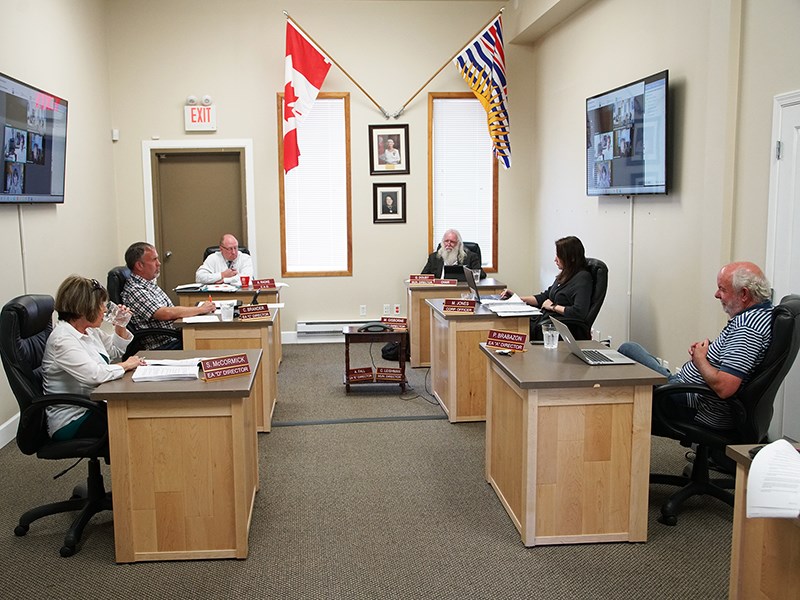qathet Regional District will be holding a workshop to determine allocations for grants-in-aid, with the demand exceeding the monetary supply.
At the June 17 finance committee meeting, finance chair and city director George Doubt said the committee had choices. One was that it could make decisions on the applications at the meeting and to forward recommendations to the board. The other prospect was to convene a workshop to discuss the applications at length.
Electoral Area D director Sandy McCormick suggested the committee consider the applications at the committee meeting.
Electoral Area C director Clay Brander said the staff report suggested one option was to convene a workshop to consider the grant requests in further detail and forward these recommendations to the June 2020 regional board meeting.
“So, if we were to have a workshop, it would have to happen in the next week,” said Brander.
Doubt said his preference would be to get together and have a workshop so directors could spend time going through each application carefully, looking at what they want to do.
Electoral Area B director Mark Gisborne said a third option would be, rather than having a workshop, to take a look at the applications at the finance committee meeting and have an emergency meeting before the board meeting to finalize the applications.
“It is worthwhile to have some discussion today because from the looks of what’s before us, we have received requests in excess of what is available,” said Gisborne. “It will require creative thinking in order to try and make sure the taxation is fair and we are able to support such organizations as we can. We should at least look through it today, and we can decide to hold another meeting to hammer out where the money goes.”
Electoral Area A director and board chair Patrick Brabazon said if the committee was talking about a workshop, that’s one thing. Another finance committee meeting is a totally different thing, he added.
“Directors need to be clear what they are talking about and the ramifications of each,” said Brabazon.
Brander said he preferred a workshop because it’s a more informal setting.
Electoral Area E director Andrew Fall said there were 13 applications for grants and it could take a while to go through them. He said he thought it would be useful to look at them at the finance committee meeting and if the committee finds some are difficult, they can flag those applications. He said some applications may have consensus around the table and can go forward to the board meeting for further consideration.
Gisborne said a workshop would not be a public meeting and because the grant applications had budgetary implications, it would be most appropriate to have it handled by the finance committee.
The committee carried a motion that the finance committee consider the items to make recommendations to the board.
Manager of financial services Linda Greenan then shared a spreadsheet with the grant applications for committee consideration. She said there were 13 applications for consideration before the committee, and the amount of the requests exceeded the money available.
Directors approved a recommendation for a $2,500 grant for the Savary Island Land Trust Society to be approved by the regional board.
Directors then discussed other grant applications and allocating funding from sources other than those intended for the grants, but there was a question about whether the recommended measures complied with bylaws or other policy.
Doubt said he has become more encouraged to think about having a workshop to discuss grant applications in an informal framework, where directors were not so bound to motions and amendments. He proposed that the workshop happen before the June 25 regional board meeting.
Gisborne said the committee was in uncharted territory because in the past, the deadline to get these applications into the regional district was February, so when the board went to pass the budget, it was known who needed money.
“What we did this year was we passed a budget and we had no idea who was going to come to us for how much,” said Gisborne. “We now have two deadlines for people to get their funding requests in. We need to look at our financial assistance policy, otherwise we are going to be in the same problem next year, where we pass the budget and then get these requests.
“This was our fault for passing the budget without knowing what the community needs. This is a headache; these are uncharted waters and it’s our fault.”
Brander said the board is in a certain situation regarding demand and he does not think it’s irresponsible behaviour.
“We have to establish a budget for these grants-in-aid and the public should know it’s not a bottomless well where we just go ahead and approve everything,” said Brander. “These are hard decisions. They (the applicants) all have good ideas and good projects to work on. We just don’t always have the money to do it.”
He said he thought the board should have a workshop in an informal setting where it is not bound by the same rules as a meeting.
The finance committee decided to hold a workshop prior to the July board meeting to consider all grants-in-aid. Gisborne was opposed, saying he preferred to hold a meeting that was open to the public, so the public could see what the board is doing with tax dollars.



